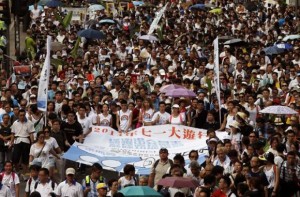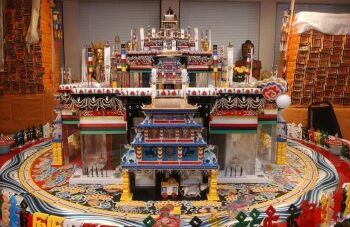Hong Kong marches for democracy as govt says “doing its utmost”
[Reuters] HONG KONG, July 1: Tens of thousands of pro-democracy protesters marched in Hong Kong on Tuesday, with many calling for the city’s leader to be sacked, in what could turn out to be the biggest and most passionate challenge to Chinese Communist Party rule in more than a decade.
Hong Kong Chief Executive Leung Chun-ying said his government would do its “utmost” to move towards universal suffrage and stressed the need for stability after nearly 800,000 voted for full democracy in an unofficial referendum.

Protesters hold a banner which reads ”2014 July 1 mass march” to demand universal suffrage in Hong Kong July 1, 2014, the day marking the 17th anniversary of the territory’s handover to China.
Credit: Reuters/Bobby Yip
Tensions flared early as activists from the League of Social Democrats burned a copy of a “white paper” released by Beijing last month that reasserted the central government’s authority over the former British colony, enraging many. The group also burned a portrait of Leung.
Security was tight with tension running high among pro-democracy activists after the referendum highlighted the deep divide in the city of more than seven million people. Aerial shots showed key arteries packed with marchers.
Roads were closed off around Victoria Park, a small, green oasis named after the former British queen, where the rally started as demonstrators marched to the central business district surrounded by police.
“I think the people’s wish on this vote is very clear and they are not taken in by recent suggestions that we should pocket whatever we are offered in the hope that more would come later. This is just rubbish,” said Anson Chan, Hong Kong’s former top civil servant and a key supporter of the unofficial referendum.
Organisers of the annual July 1 rally, marking the day the territory returned to China in 1997, are expecting the largest turnout since 2003, when half a million people demonstrated against proposed anti-subversion laws which were later scrapped.
Tung Chee-hwa, the city’s leader at the time, stepped down in March 2005, nearly two years before completing his second five-year term.
“I think in view of the vote of almost 800,000 people in favour of democracy, real democracy, not the type of democracy Beijing is suggesting, that today is probably going to be one of the most pivotal moments in the history of the democratic movement in Hong Kong,” said lawyer Sean Leonard, from the think tank HKU International Institute of Financial Law.
“It’s about time Beijing woke up.”
Pro-democracy groups are demanding greater democracy in elections for the city’s leader, or chief executive, in 2017.
Chinese authorities are keen to ensure that only pro-Beijing candidates make it on to the ballot. Democracy activists want the nomination process to be open to everyone.
Hong Kong returned to China with wide-ranging autonomy under the formula of “one country, two systems”, allowing such protests to take place. But China bristles at open dissent, especially over sensitive political matters such as demands for universal suffrage and the annual June 4 vigil in Hong Kong remembering China’s crackdown on pro-democracy protesters in Beijing in 1989.
Chinese Vice President Li Yuanchao urged a visiting Hong Kong youth group on Tuesday to make sure young people “staunchly uphold “one country, two systems” and “pass on the fine tradition of patriotism and loving Hong Kong”, China’s Xinhua news agency reported.
Beijing’s Liaison Office in Hong Kong went further.
“We are firmly against the radical and illegal activities launched by very few people, because we all have responsibilities to defend the bottom line of law which Hong Kong people cherish,” office head Zhang Xiaoming said in apparent reference to the referendum and planned protests.
“Central government firmly supports the universal suffrage in Hong Kong, and its sincerity and determination is unswerving. This kind of sincerity and determination won’t have any change or shake because of the so-called referendum or the scale of the march.”
The rally will be watched closely by activist leaders in self-ruled Taiwan, viewed by China as a renegade province, and in neighbouring Macau, where a bill providing lavish perks for senior civil servants was withdrawn days after the largest protest since China resumed control over the former Portuguese colony in 1999.
Media reported that a Taiwan activist and outspoken critic of his government’s attempts to seek closer ties with Beijing was stopped from entering Hong Kong to attend Tuesday’s rally.
“NOT LOVING HONG KONG”
A large banner on the side of a vehicle inside Victoria Park said: “Guard Hong Kong people’s autonomy,” “don’t fear Chinese Communist Party’s threat,” with others calling on Leung to step down.
Another banner tied to a fence in the park said: “The Communist Party holding a fake general election in Hong Kong is not loving the country, not loving Hong Kong,” while another mocked the white paper, which says loving China is a basic requirement for the city’s administrators.
Other groups wore T-shirts calling for real elections.
Protesters included the spiritual group Falun Gong, which is banned on the mainland, and parents with young children.
“Although she doesn’t know what’s happening, I still want to teach her and let her know what is going on in the city,” said Lam Wai Yee, 30, whose 1-1/2-year-old was asleep in a stroller.
Several groups, including Scholarism and the Hong Kong Federation of Students, have indicated they will stage overnight vigils after the march in a possible prelude to a planned campaign to shut down the city’s financial district.
Speaking at a flag-raising ceremony to mark the 17th anniversary of Hong Kong’s return to China, Chief Executive Leung said the government was trying hard to forge a consensus on political reform.
“The (special administrative region) government and I will do our utmost to forge a consensus in the community and work together towards the goal of implementing universal suffrage for the chief executive election on schedule and in accordance with the law,” Leung said at Golden Bauhinia Square, where ceremonies for the handover of Hong Kong were held in 1997.
Many Hong Kong people are concerned that Beijing is playing an increasing role in the city’s civil and political life since the handover.
Occupy Central with Love and Peace, the group behind the unofficial referendum, has threatened to lock down the Central area of Hong Kong, home to some of Asia’s biggest companies and banks, as part of its campaign.
It has ruled out taking action to blockade the central business district on Tuesday, saying it “wouldn’t be the right moment”. A decision would be taken later, depending on the government response, it said.
(Additional reporting by Twinnie Siu; Emily Chung, Nikki Sun, Eiffy Luo and Adam Rose in Hong Kong and Ben Blanchard in Beijing; Editing by Anne Marie Roantree and Nick Macfie)



